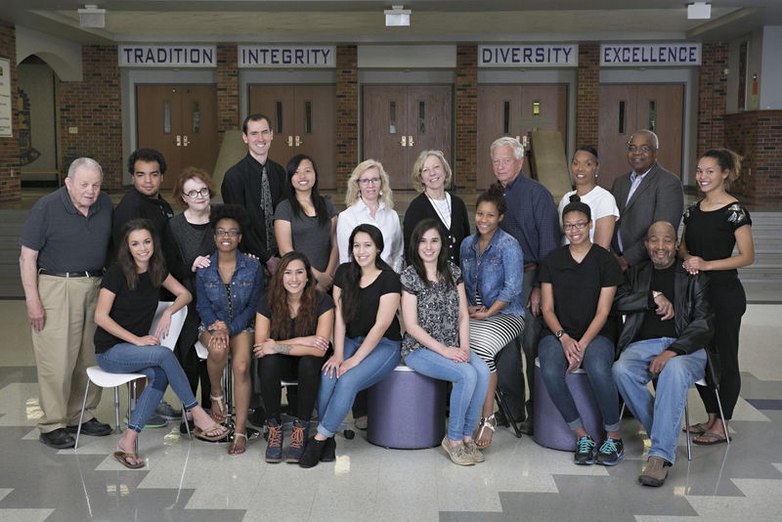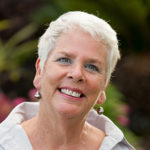
Missouri high schoolers in Talk Story, Write Story offered more than $700,000 in scholarships
Originally published on The Columbia Daily Tribune website

Leaving his wife and baby asleep, Erik Potter slipped away into autumn darkness every Monday and Friday morning to drive to Hickman High School, where an early-bird secretary buzzed him in. With just 90 minutes available in an empty conference room, Potter and senior Vy Le always got straight to work on Le’s future.
Half an hour later, veteran media executive Amy McCombs, holder of the Lee Hills Chair in Free-Press Studies at the Missouri School of Journalism, arrived by cab and disappeared into another empty meeting room with senior Maia Thompson.
Columbia Board of Education President James Whitt came after lunch for his narrow window to work with 18-year-old Tameka Stennis before she reported to Kewpie basketball practice. Missourian Managing Editor Jeanne Abbott and senior Lisa Lantz took their turn in the same quiet room at 4:15 p.m. By the time they left, it was dark again; only the cleaning crew remained.
These twice-weekly meetings, which later expanded into three and four a week, were the heart of my resident fellowship at the Donald W. Reynolds Journalism Institute this academic year. The award allowed me to do a demonstration project to test my belief that generous-hearted community mentors could — and would — help financially challenged students with B-plus grade averages write their way into scholarships to pay for college.
Talk Story, Write Story had never before used volunteer coaches to work one-on-one with students to win scholarships. The program began without name or direction 18 years ago in my 80 percent Native Hawaiian community of Hana, Hawaii. An English teacher there knew I had twice been a Pulitzer Prize finalist in feature writing and asked me to help a young man with his junior class essay.
Reluctantly, the student who needed the assignment to pass his class sat with me on a bench under a monkey-pod tree outside his classroom. Native Hawaiians have an ancient tradition of oral storytelling, so he talked through the tale he wanted to tell and then, with encouragement, wrote it by hand in his lined notebook. He passed the class. I submitted his story to a writing competition, and he won first prize.
Word got around that the wife of Dean Wariner, the sixth-grade teacher, could help with English homework. I began sitting under the monkey-pod tree with regularity. Because 70 percent of the 325 or so K-12 students at our school qualified for free lunch, and many for free breakfast, the best way those talented, smart, resilient children of character could get into college was by earning scholarships. If I mentored them, they had a better chance of winning.
The effort was addictive. Dean and I grew passionate about helping “our kids” get a better shot at their academic dreams. High school graduates fanned out on scholarships to Stanford, Williams, Princeton, Berkeley, UCLA, the Fashion Institute of Technology, Pepperdine and state schools in California, Colorado, Washington, Missouri, Arizona and elsewhere. Some Hana kids continued on to graduate from school, joined Teach for America and studied abroad. All of them, in their own ways, are making the planet better.
Our reward has been to sit on our porch, pour the lemonade and listen, rapt, when they return to share their world-conquering stories with us. This payment is beyond price.

In 2013, Dean and I were invited by the Association of Alaska School Boards to take what had become Talk Story, Write Story to teachers and students in Alaska. We conducted workshops for educators wanting to incorporate our program into their curricula, then worked online with them and their students.
The Native Hawaiian, Native Alaskan, Hispanic, African-American, Caucasian, Native American and Asian heritage students we mentored from 1998 through last December have earned more than $7 million in college scholarships. Sixteen students are Gates Millennium Scholars (http://www.gmsp.org). Three others are deserving Gates finalists now attending college on other monetary awards.
I never intended to teach. When I drove away from Mizzou in January 1969, I planned to be a roving correspondent for The Associated Press for the rest of my life. My AP career lasted 25 years. Things change.
I am back at Mizzou 50 years after I arrived as a freshman. My homecoming has been sweet; luck has ridden my shoulder.
I am lucky that Dean, a former newspaper editor who earned two master’s degrees at age 56 to become a public school teacher, shares the load. I am lucky a friend had friends named Brady and Anne Deaton. I am lucky RJI’s Brian Steffens was my mentor and the Missouri Press Association’s Doug Crews was our cheerleader. I am lucky my Facebook friend Jane See White, born and raised in journalism in Mexico, Mo., asked her sister, Laura White Erdel of Columbia, to be my friend. I am lucky Curator Emeritus James Sterling offered valuable advice and cold cans of Coke. I am lucky the Missouri Press Foundation will “umbrella” Talk Story, Write Story going forward.
I am very lucky my longtime pal Vicki Russell, publisher of the Columbia Daily Tribune, and the Trib’s general manager, Andy Waters, whose father, Hank, hired me to be his Mizzou correspondent when I was in J-School, agreed the Tribune should be Talk Story, Write Story’s community sponsor.
I am lucky RJI Executive Director Randy Picht insisted Annelle Whitt, coordinator of Columbia Public Schools’ Multicultural Achievement Program (MAC), would be an influential ally. I am lucky she persuaded CPS Superintendent Peter Stiepleman, Hickman Principal Eric Johnson and Hickman counselor Todd Maher to let us try our program at Hickman.
By late September our Talk Story, Write Story team included Maher’s Mizzou graduate assistant, Jordan Reith. We stopped recruiting when we had 10 full-time mentors and two alternates. Annelle Whitt, Maher and Reith were vetting seniors.
The Bill and Melinda Gates Millennium Scholarship awards — considered the most rigorous of any scholarship for high school seniors — were ending this spring after a 20-year run, so we decided to base student qualifications on the Gates criteria: 3.3 cumulative grade point average; U.S. citizen, U.S. national or permanent resident, and ethnicity as an African-American/black, American Indian-Alaska Native, Asian Pacific Islander American or Hispanic American. Applicants had to be eligible for a federal Pell Grant.
Our luck held: Hickman had exactly 10 seniors qualified.

Using volunteer mentors to work one-on-one with students was the grand experiment. Could strangers from widely differing economic, social and perhaps ethnic circumstances with yawning age gaps bond over hard work and a shared goal to create success?
Which brings us to Hickman’s class of scholarship hopefuls.
Hope is the engine that drives the human race forward. For months these determined seniors put their heads down, gave up sleep, sacrificed family time, missed out on fun and worked harder than they had ever worked in their young lives.
They did it for two reasons: because a kind-hearted stranger came to them and told them they could do it and then helped them do it and the student didn’t want to disappoint the Samaritan; and, as they began to do it, they came to believe it.
They told their most secret and genuine stories to their mentors, who in turn helped them write the finest, truest personal essays of their lives.
In early March they found out none of them was a Gates finalist. With more than 50,000 applicants for 1,000 scholarships, the odds were against them. But with the resilience of youth and the hunger of need, they kept at it because they had been told repeatedly through the autumn and winter not to put all their eggs in the Gates basket.
By then there was a difference in them. They had new confidence. This is the gift their mentors, teachers, counselors and family gave them during this arduous, exhilarating year of achievement.
It is the attitude that so far this spring has brought the 10 students a cumulative scholarship total of more than $700,000, with more awards expected.
It was the process that taught the Talk Story, Write Story students how special, talented and smart they are. It helped them recognize their self-worth and is now bringing rewards. Working though the process gave them courage to persevere, even if the odds were daunting. That memory will stick with them for life.
So, to Jerrold Starr, Angela Marulanda, Maia Thompson, Rebecca Vega, Madeleine Tipton, Shanelle Brooks, Tameka Stennis, Arris Thornton, Lisa Lantz and Vy Le: We are lucky to know you. All of us who have shared this Talk Story, Write Story journey with you at Hickman High this year believe that you are, and will forever be, winners.
For more information about sponsoring Talk Story, Write Story in your community, contact Melody Bezenek at the Missouri Press Foundation, 573-449-4167, in Columbia.
Top photo Kim Wade / Talk Story, Write Story. From left, standing, are Bill Clark, Jerrold Starr, Amy McCombs, Erik Potter, Vy Le, Cathy Picht, Jeanne Abbott, Alan Bunch, Annelle Whitt, James Whitt and Shanelle Brooks. Seated from left are Madeleine Tipton, Maia Thompson, Rebecca Vega, Angela Marulanda, Lisa Lantz, Arris Thornton, Tameka Stennis and Gene Robertson. All are involved in the Talk Story, Write Story program, which pairs high school students with community mentors to assist them in writing essays that tell their stories.
